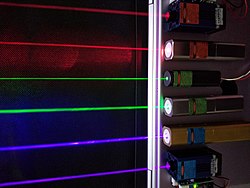Laser science


Laser science or laser physics is a branch of optics that describes the theory and practice of lasers.[citation needed]
Laser science is principally concerned with
laser applications, and with associated fields such as nonlinear optics and quantum optics
.
History
Laser science predates the invention of the laser itself.
Willis E. Lamb and R. C. Retherford found apparent stimulated emission in hydrogen spectra and effected the first demonstration of stimulated emission;[2] in 1950, Alfred Kastler (Nobel Prize for Physics 1966) proposed the method of optical pumping, experimentally confirmed, two years later, by Brossel, Kastler, and Winter.[4]
The theoretical principles describing the operation of a microwave laser (a maser) were first described by
Herbert J. Zeiger in 1953. Townes, Basov and Prokhorov were awarded the Nobel Prize in Physics in 1964 for their research in the field of stimulated emission. Arthur Ashkin, Gérard Mourou, and Donna Strickland were awarded the Nobel Prize in Physics in 2018 for groundbreaking inventions in the field of laser physics.[5]
The first working laser (a pulsed
Hughes Research Laboratories.[6]
See also
References
- ^ Einstein, Albert (1917). "Zur Quantentheorie der Strahlung" [On the Quantum Theory of Radiation] (in German).
{{cite journal}}: Cite journal requires|journal=(help) - ^ a b Steen, W. M. "Laser Materials Processing", 2nd Ed. 1998.
- ^ Batani, Dimitri (2004). "Il rischio da laser: cosa è e come affrontarlo; analisi di un problema non così lontano da noi" [The risk from laser: what it is and what it is like facing it; analysis of a problem which is thus not far away from us.]. Programma Corso di Formazione Obbligatorio Anno 2004 (in Italian). Archived from the original (Powerpoint) on June 14, 2007. Retrieved January 1, 2007.
- ^ "The Nobel Prize in Physics 1966". Presentation Speech by Professor Ivar Waller. Retrieved October 17, 2010.
- ^ "The Nobel Prize in Physics 2018". Nobel Foundation. Retrieved 2 October 2018.
- Townes, Charles Hard. "The first laser". University of Chicago. Retrieved October 17, 2010.
- S2CID 201244143. Retrieved January 25, 2021.
